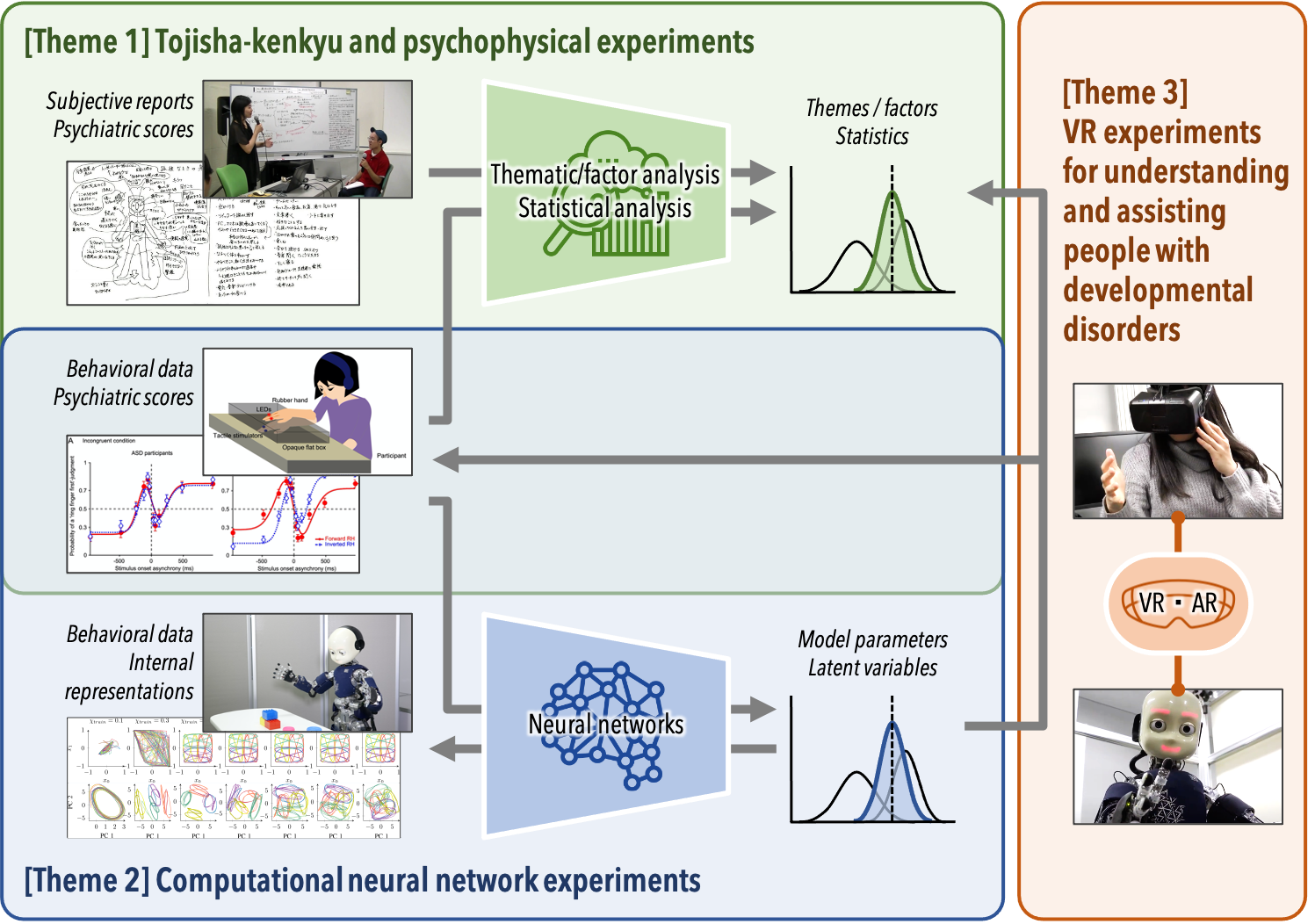Grant-in-Aid for Scientific Research (S) “Understanding Cognitive Individuality Based on a Unified Brain Theory: Assisting People with Developmental Disorders”
(Principal Investigator: Yukie Nagai, Period: 2021.07-2026.03)
Purpose and Background of the Research
Proper understanding and assessment of individual diversities in cognitive abilities are crucial for establishing a neurodiverse society. However, what neural mechanisms produce such diversities remains an open question.
This project aims to elucidate the underlying neural mechanisms for individual diversities and to design better assistances for people with developmental disorders. We hypothesize that a unified brain theory called “predictive coding” provides a unified account for individualities. Modulations in the precision of prior and sensory signals, hierarchies, time scales, etc. in predictive processing are suggested to generate individual differences. We verify this hypothesis with a focus on the ability of self-recognition, which is a cornerstone of human cognition and thus enables us to extend our findings to social cognitive abilities. This project will lead to inclusive social systems that take advantage of the diverse characteristics of humans.
Research Methods
This project addresses the following three issues by integrating cognitive developmental robotics, cognitive neuroscience, and Tojisha-kenkyu (see figure).
- Creating a hypothesis by Tojisha-kenkyu and psychophysical experiments
- Examining the hypothesis by computational experiments with neural networks
- Understanding and assisting people with developmental disorders by virtual reality (VR) experiments
Theme 1 aims to conduct Tojisha-kenkyu and psychophysical experiments that investigate the ability of self-recognition in typically developed individuals and those with autism spectrum disorder (ASD). We collect and analyze subjective reports and behavioral data to assess individual diversities as their statistical differences. Theme 2 aims to examine individual diversities using computational neural networks. We develop neural networks to examine the effects of parameter modifications on learning of self-recognition and to assess individual diversities as differences in model parameters and latent variables estimated from the behavioral data of Theme 1. Theme 3 aims to refine the hypothetical mechanism about individual diversities, which are derived from Themes 1 and 2, and to assist people with ASD based on the above mechanism. We conduct VR experiments, which alter and facilitate self-recognition.
Our hypothesis is that individual diversities emerge based on a unified brain theory called “predictive coding.” Modulations in various factors in predictive processing, such as the precision of prior and sensory signals, hierarchies, and time scales, are suggested to generate cognitive differences between individuals. Our goal is to propose a unified theory for individual diversities by addressing Themes 1-3 based on predictive coding.
Expected Research Achievements and Scientific Significance
This project enables us to define a new spectrum of developmental disorders based on the neural theory of predictive coding. Especially, self-recognition plays an important role in the development of higher cognitive abilities and thus enables us to gain a comprehensive understanding of human cognition. Ultimate goals of this project include assisting self-understanding and social communication in people with developmental disorders and establishing a neurodiverse and inclusive society.
Members
- Yukie Nagai (Project Professor, International Research Center for Neurointelligence, The University of Tokyo)
- Shinichiro Kumagaya (Associate Professor, Research Center for Advanced Science and Technology, The University of Tokyo)
- Makoto Wada (Section Chief, Research Institute of National Rehabilitation Center for Persons with Disabilities)
Links
